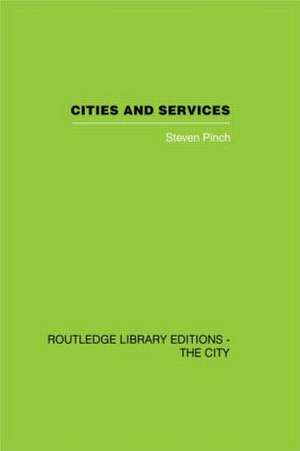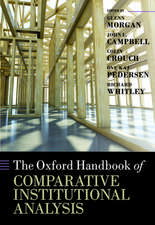Cities and Services: The geography of collective consumption
Autor Steven Pinchen Limba Engleză Paperback – 29 iul 2013
The first part of this book considers what is meant by the term 'collective consumption' and discusses the main differences between the British and American loyal government systems. It examines various geographical schools of analysis which focus on jurisdictional partitioning, locational efficiency, externalities and locational conflict. Subsequent chapters explore the relevance of public choice, neo-Weberian and neo-Marxist theories for an understanding of collective consumption. The final section looks at ways in which spatial perspectives can be linked with broader theoretical approaches in the context of modern developments.
This book was first published in it's current form in 1985.
| Toate formatele și edițiile | Preț | Express |
|---|---|---|
| Paperback (1) | 284.52 lei 6-8 săpt. | |
| Taylor & Francis – 29 iul 2013 | 284.52 lei 6-8 săpt. | |
| Hardback (1) | 792.03 lei 6-8 săpt. | |
| Taylor & Francis – 21 dec 2006 | 792.03 lei 6-8 săpt. |
Preț: 284.52 lei
Nou
Puncte Express: 427
Preț estimativ în valută:
54.44€ • 56.84$ • 45.06£
54.44€ • 56.84$ • 45.06£
Carte tipărită la comandă
Livrare economică 04-18 aprilie
Preluare comenzi: 021 569.72.76
Specificații
ISBN-13: 9780415846554
ISBN-10: 0415846552
Pagini: 228
Ilustrații: Illustrations
Dimensiuni: 156 x 234 x 12 mm
Greutate: 0.45 kg
Ediția:1
Editura: Taylor & Francis
Colecția Routledge
Locul publicării:Oxford, United Kingdom
ISBN-10: 0415846552
Pagini: 228
Ilustrații: Illustrations
Dimensiuni: 156 x 234 x 12 mm
Greutate: 0.45 kg
Ediția:1
Editura: Taylor & Francis
Colecția Routledge
Locul publicării:Oxford, United Kingdom
Cuprins
1. The geography of collective consumption 2. Jurisdictional partitioning and the 'outputs' approach 3. Externalities, locational efficiency and conflict 4. Neo-Weberian approaches 5. Neo-Marxist approaches 6. Beyond locational analysis and structuralism















